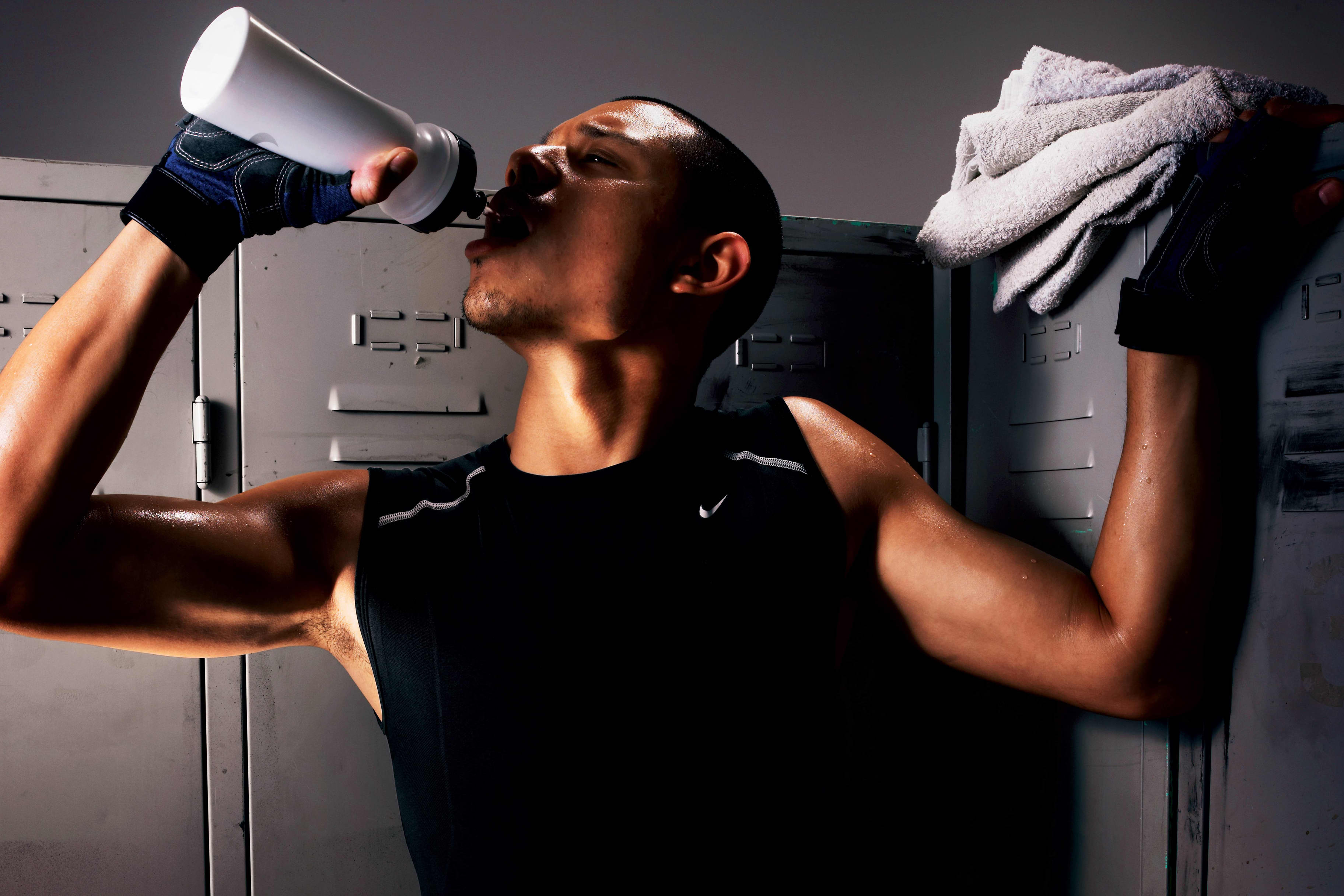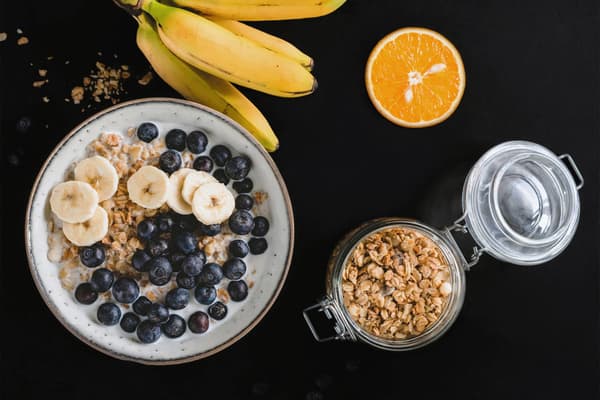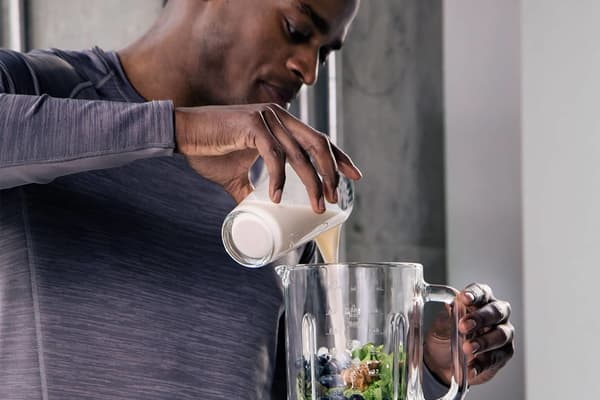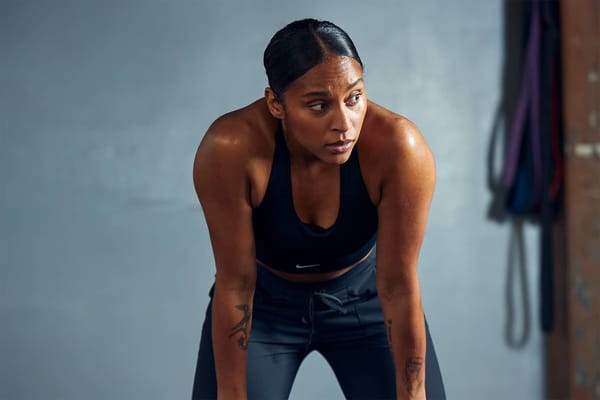Do You Really Need Electrolytes When You Work Out?
Nutrition
If you're wondering whether electrolytes are hype or actually helpful, here's what you need to know.

As your workout intensifies, your sweat level likely increases, too, and that means you'll have to replace those fluids by drinking water. But are you falling short if you don't include electrolytes, since those are getting lost through sweat, too?
The answer is yes, but here's the good news: it's easier to replenish them than you might think.
What Are Electrolytes?
Electrolytes are essential minerals that maintain the right balance of water in the body, according to Marisa Michael, RDN, board certified specialist in sports dietetics and owner of Real Nutrition in Portland, Oregon. That's a big deal, considering that about 60 percent of an adult's body weight is water, she says.
All that fluid isn't just whooshing around like you're a self-contained bath. It's working all the time to perform major functions like regulating body temperature, protecting your joints and carrying nutrients from one place to another. How does the water know where to go for jobs like that? Electrolytes.
"Electrolytes attract water and are necessary for the maintenance of body fluids, muscle contractions and nerve system functions", Michael adds.
These are the seven electrolyte directors running the show, and a few of their main functions:
· Sodium: regulates blood pressure
· Potassium: helps muscles contract, regulates nerve impulses
· Calcium: important for bones and teeth, aids in blood clotting
· Bicarbonate: helps heart function
· Magnesium: regulates blood glucose (sugar) levels, enhances immunity
· Chloride: helps digestion, balances acidity and alkalinity
· Phosphorus: aids in tissue growth and repair
Although electrolytes tend to get highlighted most when they're lost during workouts, the fact is that they're not energy boosters like caffeine. They're a critical part of making sure every system in your body is functioning the way it should, and that's particularly true for athletes, Michael says.
"It's crucial for athletes to replace both fluid and electrolytes, especially sodium, after exercise", she notes.
Are Electrolytes Important for Athletes?
With all the benefits of electrolytes, does that mean you need to load up on products like powders and gels to add to your water bottle, or buy sports drinks? Not necessarily.
There's some debate over how much supplements actually help with athletic performance. In a 2020 study published in the Clinical Journal of Sport Medicine, researchers looked at 266 ultramarathoners who were running across rough terrain in the desert.
Measuring sodium levels, and tracking electrolyte-related symptoms, they found that adding supplements didn't prevent nausea or cramping, even though many of the athletes took electrolytes to control those issues.
Part of the challenge is that many athletes don't have a hydration plan tailored to what they need specifically, suggests a 2018 study in Journal of the International Society of Sports Nutrition. After all, you could be running next to someone who sweats half as much as you do. If you both drink the same amount of water and electrolytes, you could be getting too little and they might be getting too much.

Can You Get Electrolytes Through Diet?
There are ways to measure electrolytes in the body, usually through blood tests like a basic metabolic panel. But unless you feel like stopping into your doctor's office for an electrolyte check before a big workout, this doesn't seem like the easiest or most affordable strategy. Fortunately, there's a better way to get your electrolytes on track.
"The best way to maintain electrolyte balance is through a healthy diet", says Kelsey Sackmann, RD, of Kelsey and Cooper's Kitchen in New Jersey. "Electrolytes are found in a variety of foods like fruits and vegetables, such as bananas, potatoes, green leafy vegetables, nuts, seeds and dairy products. In a typical Western diet, a common source of sodium and chloride can be found in table salt".
Other foods that give you a healthy balance of electrolytes include:
· Spinach
· Avocados
· Beans
· Kale
· Strawberries
· Milk
· Tomatoes
· Olives
· Turkey
· Raisins
· Chicken
· Watermelon

An approach that's considered "food first" is a great starting point for your basic needs. That's because you'll be getting your electrolytes for fluid balance, and also a breadth of vitamins, fibre and phytonutrients.
That's helpful for keeping your levels maintained for everyday life, but when it comes to workouts, especially intense exercise, eating some spinach or watermelon won't be adequate enough to replace lost electrolytes, Sackmann says.
RELATED: How Many Calories to Eat Each Day
"If you do any activity that makes you sweat, you need to drink extra water to cover the fluid loss", she suggests. "It's important to drink water before, during and after a workout. If exercise is intense and lasts more than an hour, a sports drink can replace electrolytes lost through sweat".
That's especially true if you're exercising in hot or humid weather, which makes you sweat more. If you're in higher altitudes, Sackmann says to increase your water and electrolyte intake, even if you're not sweating more. This is because going to a place that's at a higher altitude can cause you to become dehydrated more easily.
What Happens to Your Body When Your Electrolyte Levels Are Out of Balance?
If you're not exercising, especially for a longer duration or with more intensity, the sports drinks won't act as a prevention tool for when you do. The best case scenario is that your body will simply flush out the extra electrolytes through your urine.
If you continue to get an overabundance, especially of one type of electrolyte, that can be a problem. For instance, a study in World Journal of Emergency Medicine found that signs of electrolyte imbalance included:
· Fever
· Nausea
· Confusion
· Swelling
· Rapid heart beat
Other symptoms might include weak muscles, cramps, headaches, and even seizures. Bear in mind that these are worst-case scenarios and it's unlikely that having a sports drink while lounging through a Netflix binge will cause a dramatic imbalance.
Nearly half of the participants in the study above, for example, had an underlying condition that caused electrolytes to build up too much, such as kidney damage, diabetes and heart failure.
That said, it's still best to use powdered electrolytes or sports drinks when vigorous exercise is involved, Sackmann says. And keep your electrolytes in an ideal balance by loading up on fruits and vegetables daily. If you suspect you have an electrolyte imbalance, be sure to make an appointment with your doctor.
For more expert-backed nutrition and hydration tips, be sure to download the Nike Training Club App!





